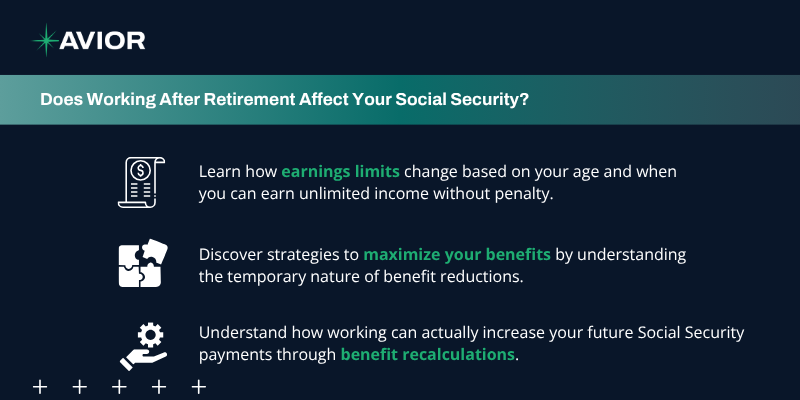Does Working After Retirement Affect Your Social Security?

Retirement doesn’t have to mean the end of your working life. Many people find themselves eager to pursue new opportunities, whether it’s consulting in their field of expertise, starting that business they’ve always dreamed about, or simply staying engaged in meaningful work. The beauty of modern retirement is that you have choices, and working while collecting Social Security benefits can be a powerful way to boost your financial security and personal fulfillment.
If you’re considering working during retirement, you’re in good company. Millions of Americans successfully combine Social Security benefits with work income every year. The key is understanding how the system works so you can make informed decisions that maximize both your benefits and your earnings. With the right knowledge, you can confidently pursue work opportunities that align with your goals and interests.
Key Takeaways:
- Learn how earnings limits change based on your age and when you can earn unlimited income without penalty.
- Discover strategies to maximize your benefits by understanding the temporary nature of benefit reductions.
- Understand how working can actually increase your future Social Security payments through benefit recalculations.
- Explore the tax implications of combining work income with Social Security benefits.
- Master the timing differences between working before and after your full retirement age.
Understanding Your Full Retirement Age
Your full retirement age determines which Social Security rules apply to you. If you were born in 1959, your full retirement age is 66 and 10 months. If you were born in 1960 or later, it’s 67. This age acts as the dividing line between having earnings limits and having complete freedom to earn as much as you want without affecting your benefits.
Earnings Limits Before Full Retirement Age
If you work before reaching your full retirement age, Social Security puts a cap on how much you can earn without affecting your benefits. For 2025, if you are under full retirement age for the entire year, Social Security deducts $1 from your benefit payments for every $2 you earn above $23,400.
Let’s break this down with numbers. If you’re 64 years old and entitled to $1,500 per month in Social Security benefits ($18,000 for the year), and you take a part-time job paying $30,000 annually, you’ve earned $6,600 more than the $23,400 limit. Social Security will reduce your benefits by $3,300 for the year. Instead of receiving your full $18,000 in benefits, you’d get $14,700.
The year you reach full retirement age gets special treatment. In 2025, Social Security deducts $1 in benefits for every $3 you earn above $62,160. This rule only applies to earnings up to the month before you reach your full retirement age, not your earnings for the entire year.
What Happens After Full Retirement Age
Once you reach your full retirement age, the earnings restrictions disappear completely. Starting with the month you reach full retirement age, there is no limit on how much you can earn while still receiving your full Social Security benefits. You could start a new business, take a high-paying consultant job, or work full-time without any reduction to your monthly checks.
This freedom is one of the biggest advantages of waiting until full retirement age to claim benefits. You receive your full benefit amount and can supplement that income with unlimited earnings from work.
How Working Might Increase Your Benefits
Working after retirement might actually increase your Social Security benefits. The Social Security Administration checks your record every year to see whether additional earnings will increase your monthly benefit.
Social Security calculates your benefit based on your highest 35 years of earnings. If your new job pays more than what you earned in one of those 35 years, Social Security will substitute the higher earnings and recalculate your benefit. Your benefit will only increase if you’re earning at a level that equals or exceeds your top 35 working years.
If there is an increase, Social Security will automatically send you a letter explaining your new benefit amount. This adjustment happens without any action required on your part.
Taxes You Need to Consider
Working while collecting Social Security creates two tax situations. First, you’ll pay the usual taxes on your work income, including Social Security and Medicare taxes. The Social Security tax limit in 2025 is $176,100, up from $168,600 in 2024. This means you’ll pay the 6.2% Social Security tax on earnings up to that amount.
The second consideration involves taxes on your Social Security benefits themselves. Depending on your income, up to 85% of your Social Security benefits can become subject to federal income tax. Whether you pay taxes on your benefits depends on your “combined income,” which includes your adjusted gross income, non-taxable interest, and half of your Social Security benefits.
If you file taxes as an individual and your combined income falls between $25,000 and $34,000, up to 50% of your benefits may be taxable. Above $34,000, as much as 85% of your Social Security benefits will be taxable. For joint filers, the threshold for 85% taxation is $44,000, with amounts between $32,000 and $44,000 subject to taxes of up to 50%.
Recent Changes and Important Numbers
The 2025 cost-of-living adjustment increased Social Security benefits by 2.5%, translating to an additional $49 for the average retiree. This brings the average monthly check from $1,927 to $1,976, according to the Social Security Administration. This adjustment affects both benefit amounts and the income thresholds that determine benefit reductions.
Recent legislative changes have created new opportunities for some workers. The Social Security Fairness Act, signed into law on January 5, 2025, eliminates the Windfall Elimination Provision and Government Pension Offset. These changes primarily affect teachers, firefighters, police officers, and other public employees who receive pensions from work not covered by Social Security. Depending on individual circumstances, some people may see their benefits increase by over $1,000 per month.
Smart Strategies for Working and Social Security
If you’re considering working while collecting Social Security, calculate your break-even point first. Determine how much you can earn before Social Security starts reducing your benefits, then decide if working beyond that point makes financial sense.
Consider the timing of your work carefully. If you’re close to full retirement age, it might make sense to limit your earnings until you cross that threshold, then increase your work hours or pursue higher-paying opportunities.
Remember that Social Security only counts wages from employment and net profit from self-employment toward the earnings limits. The agency doesn’t count pensions, annuities, investment income, interest, veterans benefits, or other government retirement benefits. This means you could have substantial income from investments without affecting your Social Security benefits.
Also keep in mind that any benefit reductions due to excess earnings are temporary. Once you reach full retirement age, Social Security recalculates your benefits to account for the months when benefits were reduced, resulting in higher future payments.
Work With Us
Working while collecting Social Security doesn’t have to be complicated when you understand the rules. The key is knowing how the earnings limits work, understanding the tax implications, and planning your strategy around your full retirement age. Whether you’re working out of necessity or choice, proper planning can help you maximize your total retirement income while avoiding costly mistakes.
At Avior, we help clients navigate the complex rules around Social Security and work income. Our experienced advisors can model different scenarios to show exactly how various levels of work income will impact your benefits and overall financial picture. Ready to make informed decisions about working and Social Security? Contact Avior today to schedule a consultation with one of our retirement planning specialists.
No Comments
Sorry, the comment form is closed at this time.




